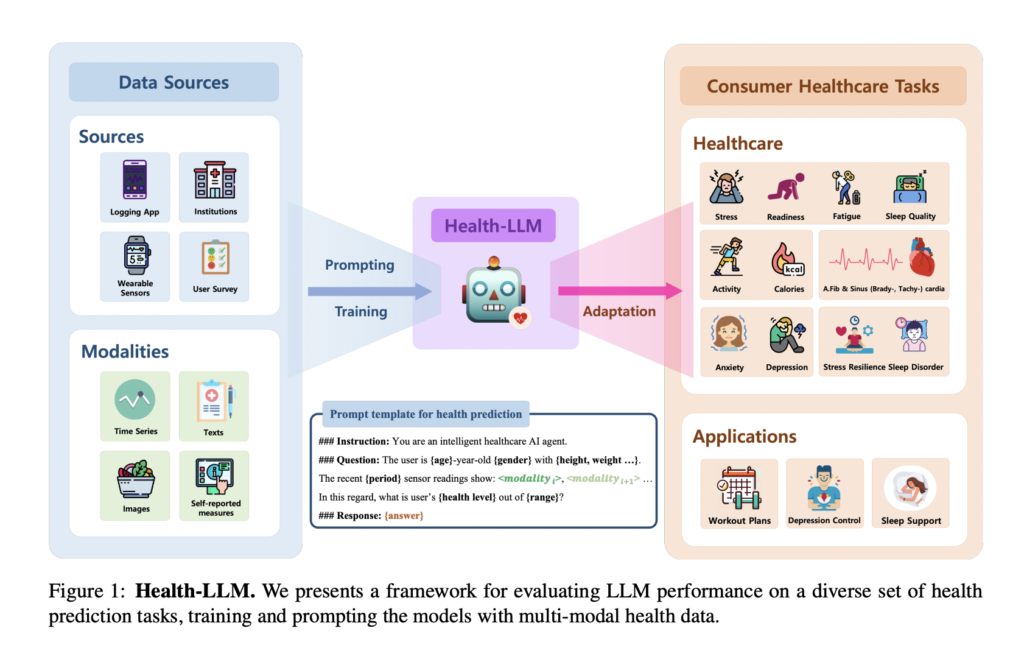The healthcare realm has been revolutionized by the advent of wearable sensor technology, which continuously monitors vital physiological data such as heart rate variability, sleep patterns and physical activity. This development has paved the way for a new convergence with large language models (LLMs), traditionally known for their linguistic abilities. The challenge, however, lies in effectively using this non-linguistic, multimodal time series data for health predictions, which requires a critical approach beyond the traditional capabilities of LLMs.
This research revolves around adapting LLMs to interpret and use wearable sensor data for health predictions. The complexity of this data, characterized by its high dimensionality and continuous nature, requires the ability of LLM to understand individual data points and their dynamic relationships over time. Traditional health prediction methods, mainly involving support vector machines or random forests, have been effective to a certain extent. However, the recent emergence of advanced LLMs, such as GPT-3.5 and GPT-4, has shifted the focus towards exploring capabilities in this domain.
Researchers at MIT and Google introduced Health-LLM, a pioneering framework designed to adapt LLMs to health prediction tasks using data from wearable sensors. This study comprehensively evaluates eight state-of-the-art LLMs, including notable models such as GPT-3.5 and GPT-4. The researchers carefully selected thirteen health-predicting tasks across five domains: mental health, activity tracking, metabolism, sleep and cardiology. These tasks were chosen to cover a wide spectrum of health-related challenges and to test the capabilities of the models in diverse scenarios.
The methodology used in this research is both rigorous and innovative. The study involved four distinct phases: zero-shot prompting, few-shot prompting augmented with chain-of-thought and self-consistency techniques, instructional fine-tuning, and an ablation focused on enhancing context in the zero-shot setting. study Zero-shot prompting tested the inherent capabilities of the models without task-specific training, while few-shot prompting used limited examples to facilitate learning in context. Chain thinking and self-constructive techniques were integrated to enhance the understanding and coherence of the models. Instructional fine-tuning further adapted the models to the specific nuances of health prediction tasks.
The Health-Alpaca model, a fine-tuned version of the Alpaca model, emerged as an outstanding performer, achieving excellent results in five of the thirteen tasks. This achievement is particularly remarkable considering the considerably smaller size of the Health-Alpaca compared to larger models such as the GPT-3.5 and GPT-4. The termination component of the study revealed that including context enhancements—comprising user profile, health knowledge, and temporal context—could improve performance by up to 23.8 percent. This finding highlights the important role of contextual information in improving LLMs for health predictions.
In summary, this research marks an important breakthrough in integrating LLMs with wearable sensor data for health predictions. The study demonstrates the feasibility of this approach and illustrates the importance of context in enhancing model performance. The success of the Health-Alpaca model, in particular, suggests that smaller, more efficient models can be equally, if not more, effective at health prediction tasks. This opens up new possibilities for applying advanced healthcare analytics in a more accessible and scalable manner, thereby contributing to the broader goal of personalized healthcare.
check Paper All credit for this research goes to the researchers of this project. Also, don’t forget to follow us. Twitter. participation Our 36k+ ML SubReddit, 41k+ Facebook community, Discord channelAnd LinkedIn GrTop.
If you like our work, you will like our work. Newsletter..
Don’t forget to join us. Telegram channel
Sana Hasan, a consulting intern at Marktech Post and a dual degree student at IIT Madras, is passionate about using technology and AI to tackle real-world challenges. With a keen interest in solving practical problems, he brings a fresh perspective to AI and real-life solutions.
